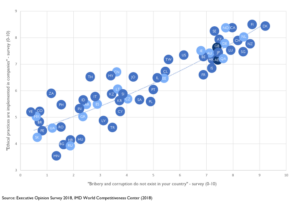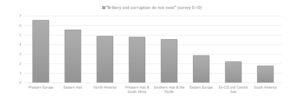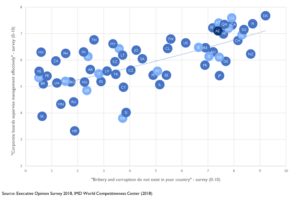
Corruption and ethical practices perceptions
The issues of governance scandals and corporate control failures are perennial and persistent. In the last year, companies and industries ranging from airlines to banking, data analytics, health technology, marketing, transportation and delivery, have been exposed to situations related to abusive or discriminatory working relationships, bribery, corruption, data breaches, or just simple fraud. The implication of any of the above is destructive for all stakeholders of a company: customers, employees, investors, and executives are all affected in different aspects of their lives. Equally important, is the fact that the society as a whole is also affected because the presence of corporate scandals erodes the confidence in organizations, increases the uncertainty and thus the cost in investing; it ultimately harms the credibility and reputation of officials and institutions at the firm and country level.
In this edition of the criterion of the month we present the relationship between variables from our dataset that capture the perception on corruption and practices within firms.
Research on corporate governance points to the legal and institutional framework as mechanisms that can address control failures. They are related with the rule of law in a country, the strength and independence of the judicial system, and the time it takes for decisions to be finalized and implemented. The top panel in Figure 1 presents the responses by mid- and upper level managers from our Executive Opinion Survey as to the existence of bribery and corruption. The answers are aggregated at a regional level and the higher number denotes a perception of lower presence of bribery and corruption in the country. As the figure outlines, Western Europe is characterized by the lowest presence of corruption followed by Eastern Asia and North America, while South America exhibits the highest.
Figure 1: Corruption perceptions by region
Figure 2: Ethical practices by region
Figure 3: Corruption perceptions and corporate board supervision on management
Even more telling is the relationship between corruption perceptions and implementation of ethical practices at the firm level. Figure 4 identifies a strong positive relationship between the two criteria with a correlation coefficient equal to 0.90.

Figure 4: Corruption perceptions and ethical practices in companies
Research Information & Knowledge Hub for additional information on IMD publications
When the leaders of the Brics group of developing countries gather on Sunday for their 17th annual summit, the backdrop is one of the most geopolitically volatile the bloc has faced in years, with trade tension, regional conflicts and energy insta...
When Chinese Premier Li Qiang addressed the World Economic Forum’s “Summer Davos” in Tianjin, China, his message was clear: China must become a “mega-sized” consumption powerhouse. Not just the world’s factory, but its market too. His words underl...
For years, multinational companies operated in the Middle East with the belief that while politics could flare up, trade would largely continue. That assumption, while once reasonable, is now under serious strain. The war between Israel and Iran l...
To understand America’s aggressive shift on trade, you must first grasp the silent, slow building, decades-long erosion of American middle-class prosperity. This shift began well before President Trump and will outlive him. It is rooted in the col...
After more than a decade of war and isolation, Syria is edging back into the global economy. The signs are familiar: commercial flights have resumed, sanctions are being eased and its debts are being cleared. Gulf investors are circling. Infrastru...
Research Information & Knowledge Hub for additional information on IMD publications
Research Information & Knowledge Hub for additional information on IMD publications
Research Information & Knowledge Hub for additional information on IMD publications
Research Information & Knowledge Hub for additional information on IMD publications
Research Information & Knowledge Hub for additional information on IMD publications
in Gensler, Gary (Ed.); Johnson, Simon (Ed.); Panizza Ugo (Ed.); Weder di Mauro, Beatrice (Ed.) / The Economic Consequences of The Second Trump Administration: A Preliminary Assessment, pp. 239-244 / PAris: CEPR Press, 2025
Research Information & Knowledge Hub for additional information on IMD publications
Published by International Institute for Management Development ©2025
Research Information & Knowledge Hub for additional information on IMD publications
in I by IMD
Research Information & Knowledge Hub for additional information on IMD publications
Research Information & Knowledge Hub for additional information on IMD publications
Research Information & Knowledge Hub for additional information on IMD publications









